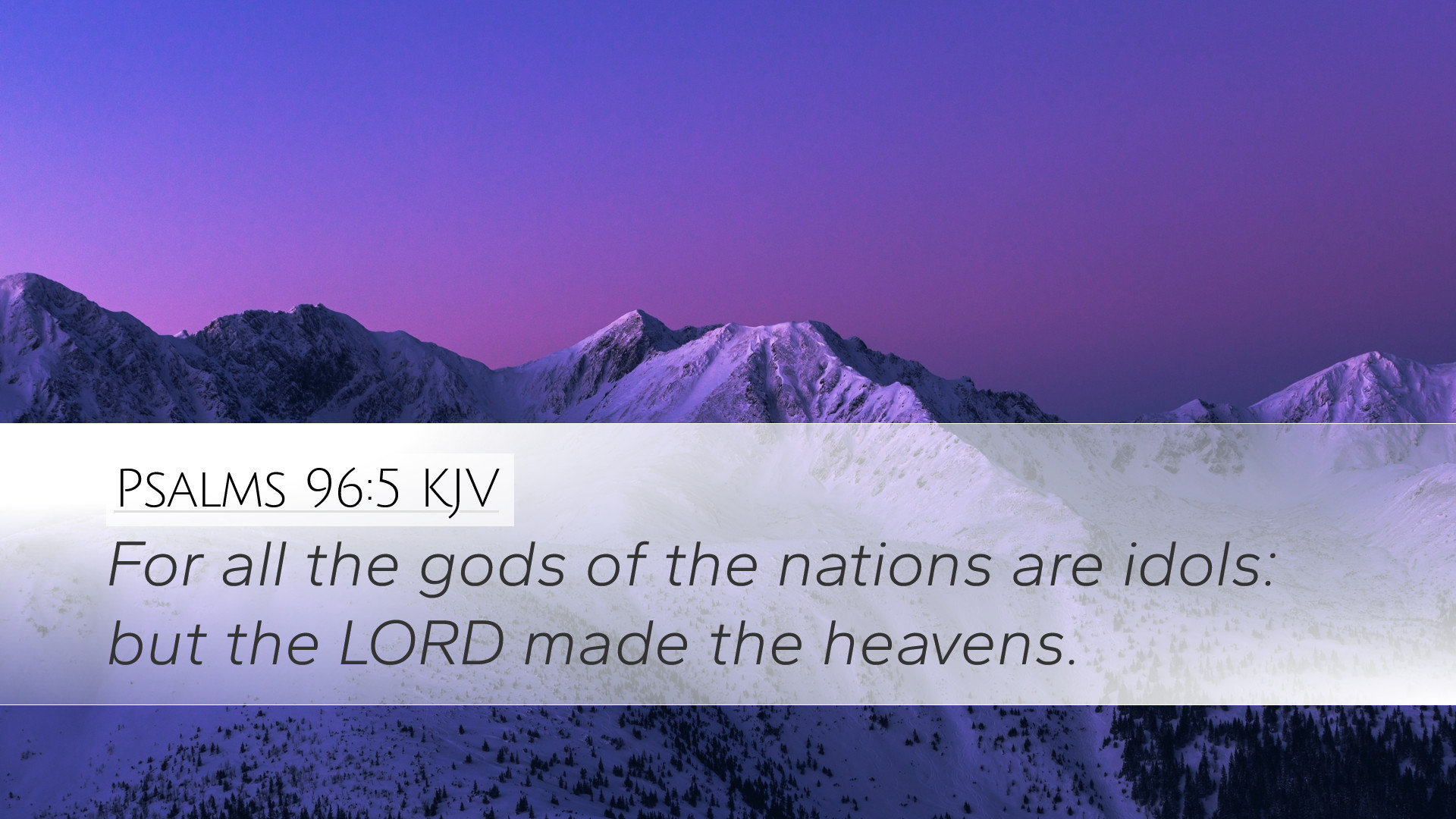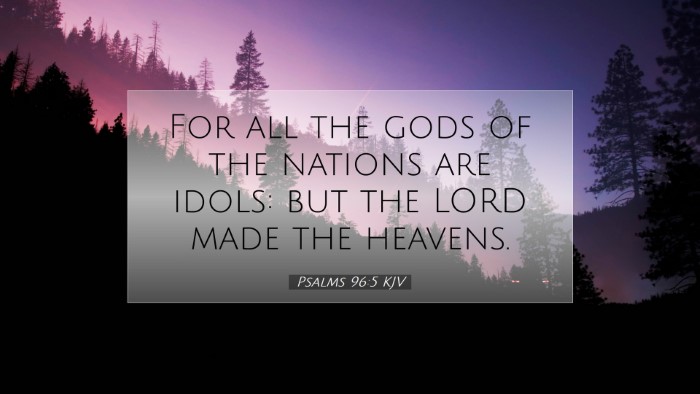Psalms 96:5 Commentary
Verse: "For all the gods of the nations are idols: but the Lord made the heavens."
Introduction
This verse from Psalm 96 forms a crucial part of the psalmist's declaration of the Lord's supremacy over all creation. It emphasizes the futility of idolatry, contrasting the lifeless "gods" of the nations with the living God who created the heavens. Insights from various public domain commentaries such as those by Matthew Henry, Albert Barnes, and Adam Clarke will be woven together to provide a comprehensive understanding.
Contextual Background
The psalm is a call to worship, urging all of creation to sing praises to God. It highlights the universality of God’s reign and suggests that His glory exceeds that of any idol or false deity. Understanding this context is vital for interpreting the significance of the statement about idols.
Analysis of "The Gods of the Nations are Idols"
Matthew Henry: Henry reflects on the notion that the gods worshiped by surrounding nations were mere representations of their imaginations—lifeless, powerless, and incapable of action. He asserts that the term 'idols' indicates their inability to fulfill the needs of their worshipers, standing in stark contrast to the living God.
Albert Barnes: Barnes emphasizes that the 'gods' referred to here are not merely wooden or stone images but represent anything that diverts one’s devotion from the true God. He paints a vivid picture of the folly of human hearts that chase after these empty substitutes for God's glory.
Adam Clarke: Clarke further elaborates on the historical context, noting that many nations, in their pursuit of false gods, often engaged in practices that were morally degrading. This illustrates not only their spiritual blindness but also serves as a warning against the insidious nature of idol worship.
Contrast with the Lord
The Lord Made the Heavens: This phrase is pivotal as it asserts God's sovereignty and creative power. The contrast is stark; while the idols are created by man's hands, the Lord is the creator of all that exists in the heavens and the earth.
God's Sovereignty
Matthew Henry: Henry notes that by claiming God as the maker of the heavens, the psalmist affirms God's authority over nature. Every star and celestial body bears witness to His greatness, thereby underscoring that genuine worship must be directed to the Creator.
Albert Barnes: Barnes supports this view by stating that God’s act of creation is an active demonstration of His power and majesty, setting Him apart from impotent idols. This act affirms that all creation exists under His dominion and is ultimately accountable to Him.
Adam Clarke: Clarke highlights the implications of recognizing God as the Creator, encouraging believers to cultivate a relationship with Him that acknowledges His power and authority. It compels worshipers to understand their place in creation and recognize their need for a sovereign God.
Theological Implications
This verse invites deep theological reflection regarding the nature of God and the consequences of idolatry. It is a clarion call to the faithful to remain steadfast in their worship, directing their hearts and lives towards God alone.
Idolatry Today
Matthew Henry: Henry cautions that while physical idols may not be prevalent today, spiritual and emotional idols exist. These can include desires, ambitions, or relationships that usurp God's rightful place in the heart of a believer.
Albert Barnes: Barnes asserts that the primary issue with modern idolatry lies in misplaced affections. Anything that distracts from God’s glory becomes an idol, demonstrating the need for vigilance in maintaining true worship.
Adam Clarke: Clarke would encourage believers to examine their lives for modern equivalents of idolatry—be it materialism, success, or personal ambitions—urging them to replace these with a fervent devotion to God alone.
Conclusion
Psalms 96:5 presents profound insights into the nature of God and the absolute futility of idols. It serves as a reminder for pastors, theologians, and believers alike that worship must be directed to the one true God who alone created the heavens, rather than to any false representation that humanity might erect. In a world where distractions are plentiful, the call is for an undivided heart that recognizes and honors God as the sovereign creator of all that is.


